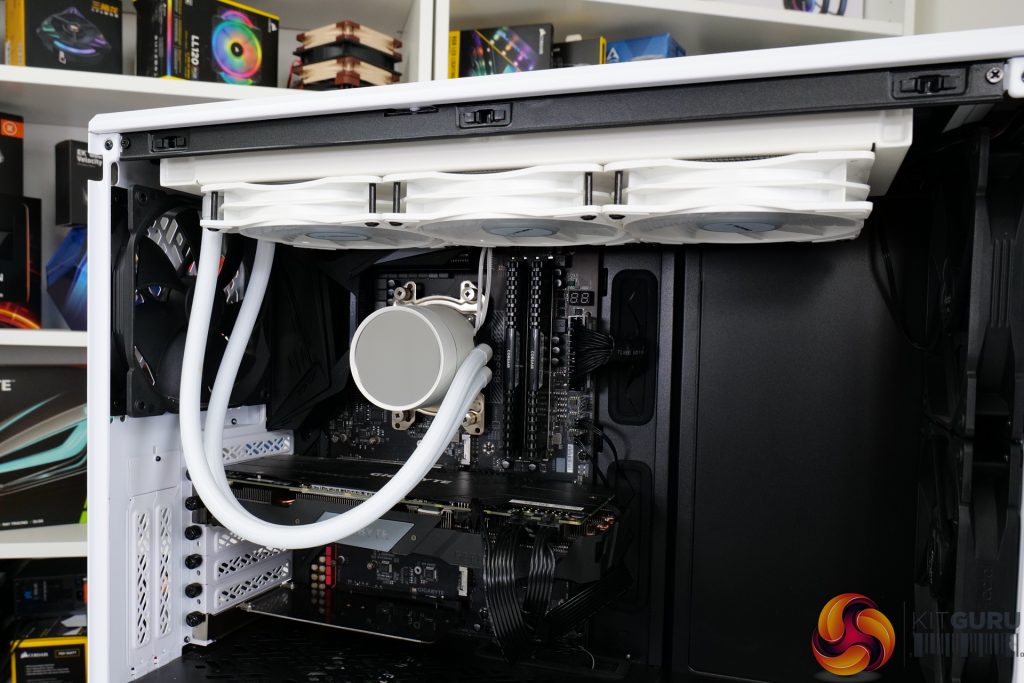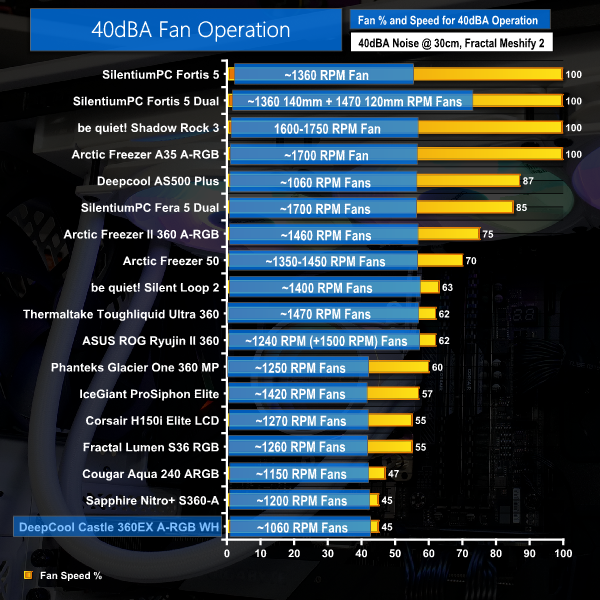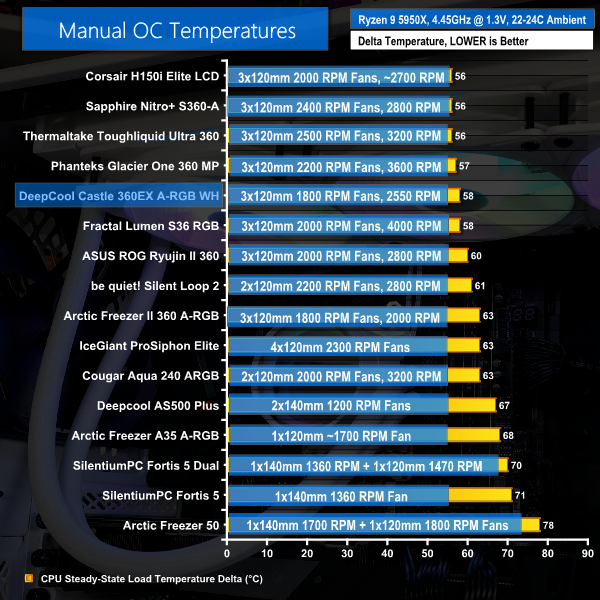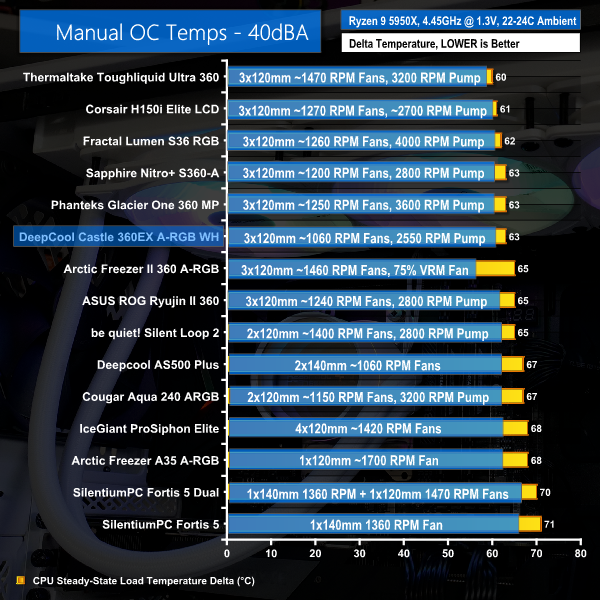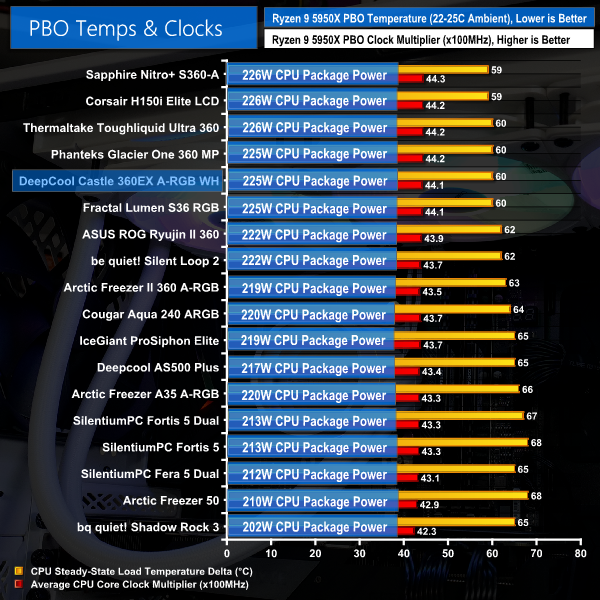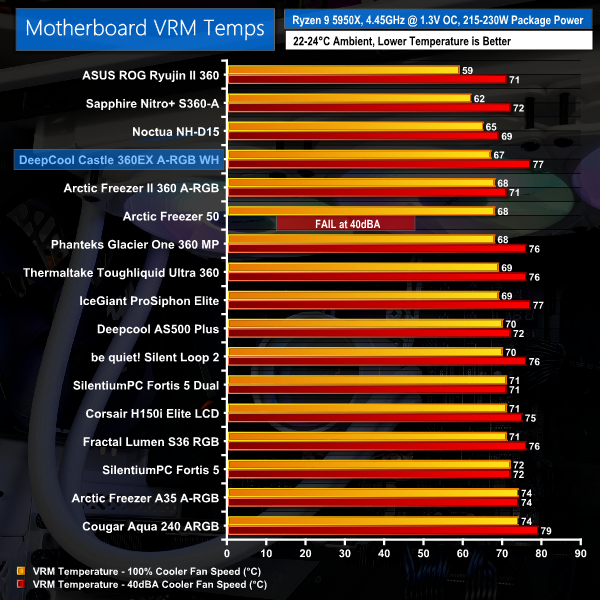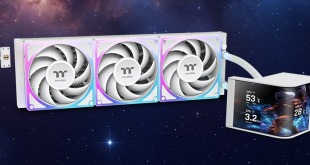Test System:
- Processor: AMD Ryzen 9 5950X
- Overclocked Settings: 4.45GHz all-core @ 1.312V (UEFI), Medium LLC – around 1.3V delivered
- Motherboard: Gigabyte B550 Aorus Master
- Memory: 32GB (2x16GB) Corsair Vengeance LPX 3600MHz 16-18-18-36 DDR4 @ 1.35V
- Graphics Card: Gigabyte RTX 2060 Super 0dB Mode
- Chassis: Fractal Design Meshify 2
- Chassis Fans: 2x140mm 1000 RPM Fractal Front Intake, 1x140mm 1000 RPM Fractal Rear Exhaust, 1x140mm 1000 RPM be quiet! Pure Wings 2 Roof Exhaust (for air cooler testing)
- Power Supply: Seasonic Prime TX-1000
- Operating System: Windows 10 Pro 64-bit
Testing Methodology:
- For testing, we use a 30-minute looped run of Cinebench R23 and record the steady-state CPU temperature at the end of the test. This ensures that the CPU has had ample time to warm up and reach steady state under all of the coolers.
- Ambient is maintained around 22-24 degrees Celsius. Where there is variation beyond this temperature range, we add in extra repeated tests to ensure consistency.
- We also test each cooler with at least two fresh installs (typically three) to mitigate the likelihood of a dodgy mount spoiling results.
Test Results:
Acoustics
Let’s start off with noise performance at 100% fan speed. This is important for getting an indication of where our performance expectations should lie based on noise output.
Registering at 52 dBA using our recording method, the DeepCool Castle 360EX A-RGB is one of the loudest coolers that we have tested. That’s with its triple CF120 fans at full 1800 RPM speed and the pump running at 2550 RPM.
Given that higher speed fan combinations on competing coolers are often lower noise in our chart, the acoustic efficiency of DeepCool’s chosen fans looks very questionable. I guess there is the saving grace of a strong 500-1800 RPM PWM control curve, though.
In order to get the unit running at 40dBA, we had to restrict the CF120 fans down to 45% duty cycle which translated into 1060 RPM running speed. The pump was maintained at 2550 RPM.
This is a large proportion of the PWM duty cycle to restrict, but it highlights the relative noise inefficiency of DeepCool’s chosen fans on this budget cooler.
Thermal Performance
Performance-wise, though, we see reasonable results from this cost-effective 360mm all-in-one. A delta temperature recording of 58C puts the DeepCool unit’s performance in-line with that of a similarly-priced triple-fan competitor from Fractal. And the Castle 360EX A-RGB White’s performance is only a touch behind that of some higher-cost Asetek units.
So at least we are seeing early signs of the heavy noise output delivering competent cooling performance.
Even when locked to 40dBA noise output, the Castle 360EX A-RGB maintains its solid level of cooling performance. A 63C delta puts DeepCool’s 360mm unit in line with the performance of a couple of Asetek-based alternatives. But the better noise efficiency of the fans on Fractal’s Lumen S36 RGB allow that cooler to open up a slight lead over DeepCool.
As always, it is critical to note that small difference in the displayed delta temperatures are not as important for our PBO testing because the clock speed and cooling power achieved are more important metrics.
With the CPU running in PBO mode, we once again see DeepCool’s 100% fan speed unit matching the performance of the Fractal Lumen S36 RGB competitor.
This is a good thing, though, as that Fractal cooler proved very well balanced in our review and sells for around the same price as the Castle 360EX A-RGB White. So DeepCool has clearly found a good market void with the performance and price of the cooler we are testing in this review.
225W of package power is a solid result for a reasonably priced 360mm AIO. Only the (more expensive) triple-fan big boys can marginally outperform DeepCool’s 100% fan speed performance here.
Interestingly, the Castle 360EX A-RGB White does very well when it comes to VRM cooling performance at full fan speed. This is likely an outcome of the specific fan airflow profile with respect to our motherboard’s VRM design. But it is a clear positive for the DeepCool unit’s result in our testing, nevertheless.
The 40dBA noise-locked performance is very weak on the VRM temperature front, though. This is because DeepCool has to give up so much speed for the relatively noise inefficient fans to hit 40dBA.
 KitGuru KitGuru.net – Tech News | Hardware News | Hardware Reviews | IOS | Mobile | Gaming | Graphics Cards
KitGuru KitGuru.net – Tech News | Hardware News | Hardware Reviews | IOS | Mobile | Gaming | Graphics Cards


